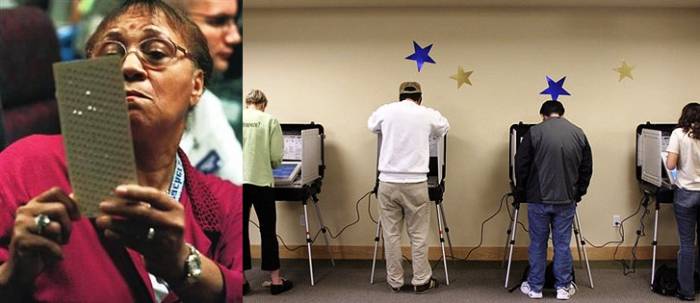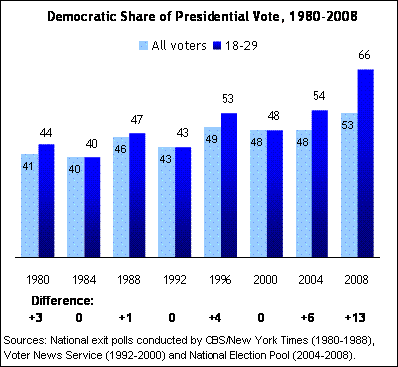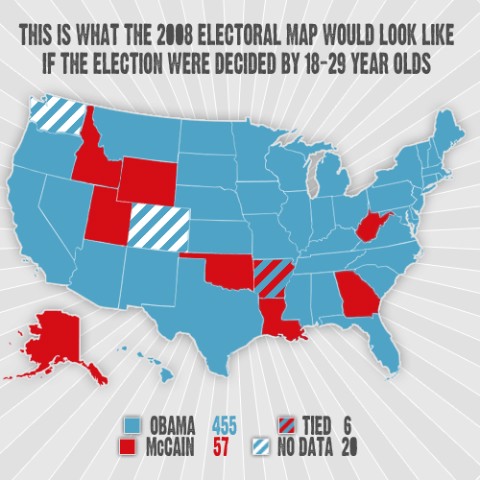What’s Behind The Right’s War On Voting

PB + D > C
Above is a mathematical analysis of predicting voting habits developed by William Riker and Peter Ordeshook in the 1968 article A Theory of the Calculus of Voting. They predicted the likelihood of voting as a combination of several factors: probability that a vote will make a difference, perceived benefit gained from a vote, plus the duty to participate, which must be greater than the perceived cost of voting.
Voters are a rare thing in the United States. They mostly come out for Presidential and national elections, while rarely for local polls, and almost never for primaries. Typically, voters are well-educated, well-off, and well-ripened.
As expected, African-Americans, Hispanics, women, and other minority groups voted heavily for Barack Obama in 2008, as did those under 30. Unexpectedly, however, the difference in voting pattern between the younger voters and older voters surpassed any seen before. According to Pew Research Center, “… 66% of those under age 30 voted for Barack Obama, making the disparity between young voters and other age groups larger than in any presidential election since exit polling began in 1972.”
To be clear, 66% of voters under the age of 30 voted for the Democratic Presidential candidate in 2008, with more young people identifying with the Democratic party. These demographic trends presented the GOP with a challenge: change political direction, hold onto current political beliefs at the expense of future elections, or work to marginalize the political impact of non-Republican demographics. They opted for voter suppression.
In Maryland, Wisconsin, and other states, Republican-affiliated PACS and action groups used robocalls to tell Democrats to vote on the wrong day. They are pushing for voter ID laws to intimidate immigrants and keep the poor out of the voting booth. They are even proposing that only those who pay income tax should be allowed to vote. And then there’s “stacking, packing, and cracking” in Texas:
Stacking is when low-income minority populations are put in districts with higher-income Anglos whose voting turnout is stronger and overpowers the minority groups at the ballot box. Packing is a term for putting more minorities into a political district than is necessary for them to control the outcomes of elections. And cracking is when a community is split between two or more districts to dilute its influence on election outcomes.
The Department of Justice is now going after states that don’t comply with the National Voter Registration Act of 1993 and the Voting Rights Act of 1965. They have heavily targeted states that fail to provide registration forms at Department of Social Services/Health & Human Services offices which Project Vote has estimated “… could add two-to-three million more voters to official rolls a year, based on the Food Stamp program alone. In 2005-2006, 21.2 million people sought this benefit nationwide. States that settled litigation over this section of the law — Illinois, Tennessee, Missouri, Ohio — have shown between 10 percent and 20 percent of public assistance clients will submit voter applications if asked by state employees.”
The DOJ can do little, however, against the pump-and-dump voter suppression campaigns financed by the Koch brothers and carried out by covert organizations that only exist around elections. But, as Art Levine points out, “Unfortunately, progressives have tended to pay more attention to Election Day dirty tricks and to electronic voting machines than to a more systemic threat: the Republican campaign to suppress the votes of low-income, young, and minority voters through restrictive legislation and rulings, all based on the mythic specter of voter fraud.”
The Senate Judiciary Subcommittee on the Constitution, Civil Rights and Human Rights will begin hearings on September 8th on, “New State Voting Laws: Barriers to the Ballot?”. It is not likely that either Justice or the Judiciary Committee will be able to reverse what has been a decades-long effort to subvert participation in democratic processes, but it signals a growing awareness of the fact that millions of Americans are being systematically denied the right to vote.
The right has a very good reason to resort to such tactics. Although more American voters identify themselves as conservative than liberal, voters actually disagree with Republicans on pretty much every single major issues. In many ways, the American public tends to be more progressive than the Democratic party: “Nearly 58 percent said government should be doing more, not less; and 59 percent agreed that government has grown because the country’s problems have grown.” The demographics show this divide is getting wider:

Defense of Marriage Act? Don’t Ask Don’t Tell? Climate change? Corporate taxes? Medicare? Social Security? Education? Republicans are the in minority opinion on each. Similarly, 82% of American voters would return Barack Obama to office if he raised taxes on the rich. In fact, most Americans would agree with Obama when he wrote in The Audacity of Hope: “I believe in evolution, scientific inquiry, and global warming; I believe in free speech, whether politically correct or politically incorrect, and I am suspicious of using government to impose anybody’s religious beliefs – including my own – on nonbelievers.”
The swing to the hard right by the Republican party in the last decade is stark especially given how much young voters are moving towards center and center-left position. In the short term, such far-right positions may help Republicans drive the most dedicated to the polls in a Presidential election and solidify it’s base with the middle class and whites, but given the shift in demographics and party affiliation, extremist politics and voter suppression will only doom the Republican party in the long run.
Aine Farrell lives and writes in Baltimore, MD. She is obsessed with all things political, issues of social justice, and cultural memes. She once cooked Julia Child a chicken, which was well-received.











The answer is actually quite simple: they hate representative democracy because it’s a check to their power. They always have and always will do everything in their power to make people cynical, apathetic, and discouraged from exercising their civic right to vote. The anti-democracy legislation (written by the corporate front group ALEC or Am. Legislative Exchange Council) is just the latest phase of this, but they have a long history of pushing things like the “poll tax” and Jim Crow laws.
Just got through reading a very interesting article. If you read it and you’re Republican, please keep in mind that the author was a Republican congressional staffer for 30 years and is in an informed position on these matters. Also keep in mind that he clearly has substantial disdain or even loathing for the Democratic party as well, but he doesn’t write at length about them because he’s not as familiar with their inner workings.
http://www.truth-out.org/goodbye-all-reflections-gop-operative-who-left-cult/1314907779
That was one long article of excuse making. Since I was 18 – I’ve never had any issue figuring where to register, how to find voting locations, and actually get there on time to vote. And lets be candid – both sides have history of less than honorable practices – like taking advantage of poor and illiterate by actually paying them cash to register and vote Democrat…herding typical non-voters and people who barely know what a Secretary of State is into buses to vote Democrat. And please – both parties when in power use redistricting to their advantage. Liberals want to block any reasonable attempts to prevent voter fraud, because then they themselves will have a more difficult time of cheating. Getting a drivers license and buying liquor is harder than voting – yet some want to make it even easier? Why not just set up an 800# to phone it in – lets make it a real free for all! And last – if you are dim enough to listen to a vm that sways how or when you should vote – then you may need to try a bit harder… a vote is worth something.
Thank you all for taking the time to comment. I wonder if any of you got a chance to watch the hearing today? It was really interesting; it should be available to watch on the Senate website by tomorrow or Monday: http://judiciary.senate.gov/resources/webcasts/livewebcast.cfm The testimony was stark to say the least.
@novenator, ALEC is of course one part of the puzzle with the support of the Koch Brothers.
@Zach Y, I scanned that piece when it first came out and I couldn’t help wondering what the hell took him so long since he was so miserable for ages! But yeah, very well-written and really interesting to see the process from an insider’s perspective. Thank you for sharing it here.
@Common Sense, thank you for reading something that you obviously found little to agree with. I do wonder if you found anything in the actual content that you believe to be false? I understand that these laws do not present a burden for the majority of Americans, but they do present real barriers to some, and those some all seem to be among likely Democrats. It is rather telling for instance, that the League of Women Voters has abandoned registration drives in Florida after 60 years because of new punitive laws that actually could cost their workers fines of up to $1,000 for keeping a form longer than 48 hours as opposed to the 10 days they had previously. Do you honestly think voter registration drives are activities we ought to discourage?
Again, thanks to you all for reading and commenting!
Pretty
Nice Post. I Just Stumbled Upon Your Weblog
And Wanted
To Say That I’ve
Truly
Enjoyed SBOBET